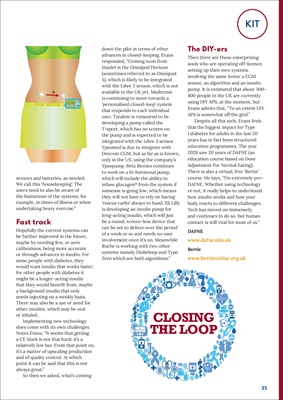
35
KIT
sensors and batteries, as needed.
We call this 'housekeeping'. The
users need to also be aware of
the limitations of the systems; for
example, in times of illness or when
undertaking heavy exercise."
Fast track
Hopefully the current systems can
be further improved in the future,
maybe by needing few, or zero
calibrations, being more accurate
or through advances in insulin. For
some people with diabetes, they
would want insulin that works faster;
for other people with diabetes it
might be a longer-acting insulin
that they would benefit from, maybe
a background insulin that only
needs injecting on a weekly basis.
There may also be a use or need for
other insulins, which may be oral
or inhaled.
Implementing new technology
does come with its own challenges.
Notes Evans, "It seems that getting
a CE Mark is not that hard; it's a
relatively low bar. From that point on,
it's a matter of upscaling production
and of quality control. At which
point it can be said that this is not
always great."
So then we asked, what's coming
down the pike in terms of other
advances in closed-looping, Evans
responded, "Coming soon from
Insulet is the Omnipod Horizon
(sometimes referred to as Omnipod
5), which is likely to be integrated
with the Libre 3 sensor, which is not
available in the UK yet. Medtronic
is continuing to move towards a
'personalised closed-loop' system
that responds to each individual
user. Tandem is rumoured to be
developing a pump called the
T-sport, which has no screen on the
pump and is expected to integrated
with the Libre 3 sensor. Ypsomed is
due to integrate with Dexcom CGM,
but as far as is known, only in the US,
using the company's Ypsopump. Beta
Bionics continues to work on a bihormonal pump, which will include
the ability to infuse glucagon* from
the system if someone is going low,
which means they will not have to
rely on having 'rescue carbs' always
to hand. Eli Lilly is developing an
insulin pump for long-acting insulin,
which will just be a round, screenless device
that can be set to deliver
over the period of a week or so and
needs no user involvement once
it's on. Meanwhile Roche is working
with two other systems namely
Diabeloop and Type Zero which are
both algorithms."
The DIY-ers
Then those are those enterprising
souls who are operating off-licence,
setting up their own systems
involving the same items: a CGM
sensor, an algorithm and an insulin
pump. It is estimated that about 300-
400 people in the UK are currently
using DIY APS, at the moment, but
Evans admits that, "To an extent DIY
APS is somewhat off the grid."
Despite all this tech, Evans feels
that the biggest impact for Type
I diabetes for adults in the last 20
years has in fact been structured
education programmes. The year
2020 saw 20 years of DAFNE (an
education course based on Dose
Adjustment For Normal Eating).
There is also a virtual, free 'Bertie'
course. He says, "I'm extremely proDAFNE.
Whether using technology
or not, it really helps to understand
how insulin works and how your
body reacts to different challenges.
Tech has moved on immensely,
and continues to do so, but human
contact is still vital for most of us."
DAFNE
www.dafne.nhs.uk
Bertie
www.bertieonline.org.uk